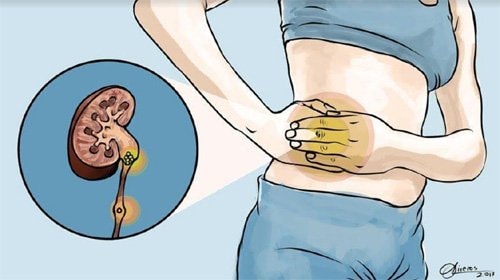7 warning signs of kidney stones
Kidney stones form and progress silently. Only when the stones are very large and begin to damage the kidneys and urinary tract do severe symptoms appear.
Low back and hip pain
Dull pain: Occasionally, there are dull, mild pains in the lower back and hips. When you see this sign, you may have small or medium stones in the renal pelvis or small stones in the ureter. Kidney or ureteral stones cause grade 1 or 2 hydronephrosis. In case of pain accompanied by urinary retention, the stones may be in the bladder neck or have fallen out of the urethra.
|
Severe pain in the lower back and hips: This pain is often called "renal colic", often starting from the lower back and hips and then spreading to the lower abdomen. This sign is often a kidney stone moving down the ureter. Causing increased pressure in the ureter, ureteral spasm, causing such severe pain.
Pain when sitting for a long time: When kidney stones develop into large stones, it becomes difficult for the patient to sit or lie in a certain position for a long time. Pressure on the areas affected by kidney stones causes the stones to rub against many internal organs, making the patient more painful.
Pink urine, cloudy urine
Stones that damage the renal tubule mucosa will cause bleeding, urine will be light pink, in more severe cases may be accompanied by pain and blood in the urine.
When the mucosal damage persists, it can easily lead to pyelonephritis - urinary tract. At this time, pus may be present in the urine. The urine is cloudy white.
Frequent urination, painful urination
One of the earliest and most common signs of kidney stones is frequent urination even though the amount of water you drink has not changed. The painful urination is due to the stones moving from the bladder to the urethra.
foul-smelling urine
The urine of kidney stone patients is often cloudy and has a foul, pungent odor due to the sedimentation of many waste substances. In cases of inflammation and urinary tract infection, the odor is stronger.
Nausea and vomiting
Nausea and vomiting are also common in people with kidney stones. You may vomit due to the excruciating pain caused by kidney stones, or because vomiting is the only way to expel toxins from the body when the kidneys are no longer able to excrete waste.
On the other hand, the nerves in the digestive tract and the kidneys are related to each other. When there is a blockage in the kidneys, it causes spasms of the smooth muscles in the ureters and kidneys. This in turn causes stomach cramps, which causes nausea and vomiting.
Fever
Kidney stones can easily cause urinary tract infections in patients, which can cause fever and chills.
Swelling of the abdominal area containing the kidneys
In severe cases, kidney stones can cause swelling in the kidney. You may notice swelling in the abdomen containing the kidney, the surrounding abdominal area, and the groin.

